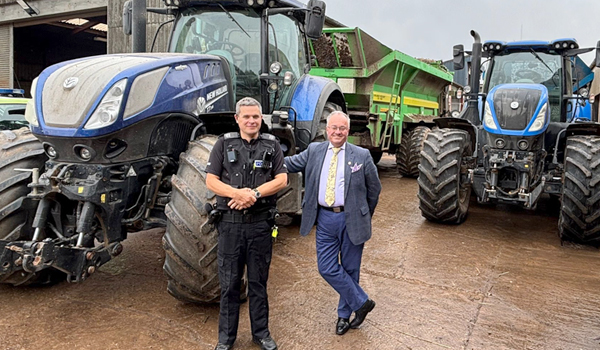PCC urges ministers to step up action to fight rural crime
Police and crime commissioner (PCC) Rupert Matthews has called on the Government to do more to protect the countryside from criminality and increase the public’s trust in rural policing.
The Leicester, Leicestershire and Rutland PCC has written to MP Sarah Jones, Minister for Policing and Crime, drawing attention to a series of issues that he says are “undermining efforts to tackle crime in the countryside”.
The PCC raised the necessity of a formal rural crime definition to overcome the challenges surrounding the categorisation of rural crime.
As it currently stands, ‘rural crime’ is not a searchable category in UK crime databases, which the PCC says makes it more difficult to log rural crimes effectively and impacts on funding and resource distribution, ‘leaving rural communities at a disadvantage’.
The PCC argued that formal categorisation of rural crime would provide a better understanding of rural crime ‘hotspots’, paving the way for a stronger policing presence and more proactive partnership working.
Mr Matthews also highlighted the “funding gulf” between ‘rural’ and ‘urban’ forces. This, he argued, has a direct impact on each force’s ability to effectively resource rural policing teams with critical equipment such as drones, torches and thermal imagers to deter and detect rural crime.
Echoing the findings of His Majesty’s Inspectorate of Constabulary and Fire and Rescue Service, Mr Matthews said the way funding is presently distributed for policing is “outdated and unfair” and said proper recognition was needed of the specialist training and equipment needed to police the countryside successfully.
Mr Matthews said: “All too often, people living or working in rural areas have low trust and confidence in policing caused by a lack of proper training or equipment for local officers, or dismissal of rural crime as less serious than urban crime by senior officers.
“If rural communities do not feel empowered and supported by an effective and properly resourced rural police team, they are less likely to continue to report crimes.
“This may in turn lead to fewer officers and resources being deployed to rural areas, starting a vicious downward spiral of growing crime and decreasing police involvement.”
He said rural crime remains a “significant concern” across the force area with offences such as machinery and plant theft, livestock worrying and fly-tipping impacting farms, rural businesses and quality of life, and costing the economy millions of pounds every year.
Mr Matthews said new legislation including The Equipment Theft (Prevention) Act 2023, which has received Royal Assent, should be implemented without delay to ensure new agricultural equipment is equipped with immobilisers and forensic marking as standard. This, he said, would make it easier for police forces to return stolen equipment and would deter criminality.
He also called for the swift introduction of The Dogs (Protection of Livestock) (Amendment) Bill 2024/25, which is currently going through the House of Lords. If granted, this would provide police forces with more powers to tackle livestock worrying and give victims more opportunities for justice.
“Our rural communities deserve to feel supported by their police both locally and nationally. With clearer definitions, fairer funding, and stronger legislation, we can give our rural police the tools they need and restore trust where it’s been lost,” Mr Matthews said.


